- Home
- Patricia Cornwell
At Risk wg-1
At Risk wg-1 Read online
At Risk
( Winston Garano - 1 )
Patricia Cornwell
A Massachusetts state investigator is called home from Knoxville, Tennessee, where he is completing a course at the National Forensic Academy. His boss, the district attorney, attractive but hard-charging, is planning to run for governor, and as a showcase she's planning to use a new crime initiative called At Risk-its motto: "Any crime, any time." In particular, she's been looking for a way to employ cutting-edge DNA technology, and she thinks she's found the perfect subject in an unsolved twenty-year-old murder-in Tennessee. If her office solves the case, it ought to make them all look pretty good, right?
Her investigator is not so sure-not sure about anything to do with this woman, really-but before he can open his mouth, a shocking piece of violence intervenes, an act that shakes up not only both their lives but the lives of everyone around them. It's not a random event. Is it personal? Is it professional? Whatever it is, the implications are very, very bad indeed… and they're about to get much worse.
Sparks fly, traps spring, twists abound-this is the master working at the top of her game.
Patricia Cornwell
At Risk
To Dr. Joel J. Kassimir, a true artist
1
An autumn storm has pounded Cambridge all day and is set to play a violent encore into the night. Lightning sears and thunder startles as Winston Garano (“Win” or “Geronimo” most people call him) strides through the dusk along the eastern border of Harvard Yard.
He has no umbrella. He has no jacket. His Hugo Boss suit and dark hair are dripping wet and pressed flat against him, his Prada shoes soaked and filthy from a false step out of the taxi into a puddle. Of course, the damn taxi driver let him out at the wrong damn address, not at 20 Quincy Street in front of the Harvard Faculty Club but at the Fogg Art Museum, and that was Win’s miscalculation, really. When he got into the taxi at Logan International Airport, he happened to tell the driver, Harvard Faculty Club, it’s near the Fogg, thought maybe if he referenced both he might sound like someone who went to Harvard or collects fine art instead of what he is, an investigator with the Massachusetts State Police who applied to Harvard seventeen years ago and didn’t get in.
Big raindrops feel like irritable fingers tapping the top of his head and he is overcome by anxiety as he stands on the old red-brick walk in the midst of the old red-brick Yard, looking up and down Quincy Street, watching people spew past in cars and on bicycles, a few on foot and hunched under umbrellas. Privileged people move through the rain and mist, belonging here and knowing they do and where they are going.
“Excuse me,” Win says to a guy in a black windbreaker and baggy, faded jeans. “Your Mensa question for the day.”
“Huh?” He scowls, having just crossed the wet one-way street, a soggy satchel dripping from his back.
“Where’s the faculty club?”
“Right there,” he replies with unnecessary snottiness, probably because if Win were a faculty member or anyone important, obviously he would know where the faculty club is.
He heads toward a handsome Georgian Revival building with a gray slate roof, the brick patio blossoming with wet, white umbrellas. Lighted windows are warm in the gathering darkness, and the quiet splashing of a fountain blends with the sounds of the rain as he follows slick cobblestones to the front door, running his fingers through his wet hair. Inside, he looks around as if he’s just entered a crime scene, taking in his surroundings, making judgments about what must have been a parlor for some wealthy aristocrat more than a century ago. He surveys mahogany paneling, Persian rugs, brass chandeliers, Victorian theater broadsheets, oil portraits and polished old stairs that lead somewhere he’ll probably never go.
He takes a seat on a stiff antique sofa, a grandfather clock reminding him that he is exactly on time and that District Attorney Monique Lamont (“Money La-Mount,” as he calls her), the woman who basically runs his life, is nowhere in sight. In Massachusetts, the DAs have jurisdiction over all homicides and have their own state police investigative service assigned to them, and what that means is that Lamont can bring anybody she wants into her personal squad, meaning she can also get rid of anybody she wants. He belongs to her and she has her ways of reminding him of that.
This is the latest, the worst of all her political maneuvering, and in some instances shortsighted reasoning, or what he sometimes views as her fantasies, all of it radiating from her insatiable ambition and need to control. She suddenly decides to send him way down South to Knoxville, Tennessee, to attend the National Forensic Academy, saying that when he returns he will enlighten his colleagues about the latest innovations in crime scene investigation, show them how to do it right, exactly right. Show them how to ensure that no criminal investigation will ever, and I mean ever, be compromised by the mishandling of evidence or the absence of procedures and analyses that should have been done, she said. He doesn’t understand it. The Massachusetts State Police has CSIs. Why not send one of them? She wouldn’t listen. She wouldn’t explain.
Win looks down at the soggy shoes he bought for twenty-two dollars at the vintage clothing shop called Hand-Me-Ups. He notices the beginning of dried water spots on the gray suit he got for a hundred and twenty dollars at the same shop where he’s gotten quite a lot of designer clothing dirt cheap because everything is used, cast off by rich people who easily tire of things or are infirm or dead. He waits and worries, wondering what is so important that Lamont has summoned him all the way up here from Knoxville. Roy, her wimpish, supercilious press secretary, called him this morning, yanked him out of class, told him to be on the next flight to Boston.
Right this minute? Why? Win protested.
Because she said so, Roy replied.
* * *
Inside the high-rise, precast Cambridge District Court building, Monique Lamont emerges from the private powder room inside her large private office. Unlike many DAs and others who wade in the world of criminal justice, she doesn’t collect police caps and patches or foreign uniforms and weapons or framed photographs of famed law enforcement officials. Those who give her such mementos do so only once, because she doesn’t hesitate to give them back or away. She happens to like glass.
Art glass, stained glass, Venetian glass, new glass, old glass. When sunlight fills her office, it turns into a prismatic fire, flashing, winking, glowing, sparkling in a spectrum of colors, distracting people, amazing them. She welcomes distracted, amazed people to her rainbow, then introduces them to the nasty storm that preceded it.
“Hell no,” she picks up where she left off as she sits down at her expansive glass desk, a see-through desk that doesn’t deter her in the least from wearing short skirts. “Another damn educational video on drunk driving is not going to happen. Does anybody besides me think outside the box?”
“Last week in Tewksbury, an entire family was killed by a drunk driver,” Roy says from a sofa catty-corner to the desk, looking at her legs when he assumes she doesn’t notice. “That’s far more relevant to citizens than some old murder case from some provincial Southern city nobody around here cares…”
“Roy.” Lamont crosses her legs and watches him watching her. “Do you have a mother?”
“Come on, Monique.”
“Of course you have a mother.” She gets up, starts pacing, wishes the sun was out.
She hates rain.
“How would you like it, Roy, if your ninety-pound elderly mother were beaten savagely in her own home and left to die alone?”
“Oh come on, Monique. That’s not the point. We should be focusing on a Massachusetts unsolved homicide, not one in Hickville. How many times do we have to go through this?”
“You’re foolish, Roy. We send in one of our f
inest and solve it and get—”
“I know, I know. Huge national attention.”
“The sure, strong hand reaching down to help those less fortunate, less, well… less everything. We get the old evidence, reexamine it—”
“And make Huber look good. Somehow, it will be him and the governor who look good. You’re kidding yourself if you think otherwise.”
“It will make me look good. And you’re going to make sure of that—”
She abruptly stops talking as the office door opens and coincidentally, maybe too coincidentally, her law clerk walks in without knocking. Huber’s son. It briefly crosses her mind that he’s been eavesdropping. But the door is shut. It isn’t possible.
“Toby?” she warns. “Am I psychotic or did you just walk in without knocking again?”
“Sorry about that. Man, I got too much on my mind.” He sniffs, shakes his shaved head, looks half stoned. “I just wanted to remind you I’m taking off.”
For good, she wishes. “I’m completely aware,” she says.
“Be back next Monday. Hanging out at the Vineyard, chilling, my dad knows where to find me if you need me.”
“You’ve taken care of all pending matters?”
He sniffs again. Lamont’s pretty sure he’s fond of cocaine. “Uh, like what?”
“Uh, like everything I’ve put on your desk,” she says, tapping a gold pen on a legal pad.
“Oh, yeah, sure. And I was a good boy, cleaned up everything, straightened up so you won’t have to pick up after me.” He smirks, his resentful feelings toward her peeking through his fog, leaves, shuts the door.
“One of my bigger mistakes,” she says. “Never do a favor for a colleague.”
“It’s obvious you’ve made your decision and it’s as final as death,” Roy picks up where he left off. “And I reiterate my belief that you’re making a very big mistake. Maybe a fatal one.”
“Cut the death analogies, Roy. They really annoy me. I could use a coffee.”
* * *
Governor Miles Crawley sits in the backseat of his black limousine, the partition up, his executive protection out of sight, unable to hear him on the phone.
“Don’t be so damn sure you get careless,” he says, staring down at his long, pinstripe-clad legs stretched out, staring blankly at his shiny black shoes. “What if someone talks? And we shouldn’t be talking about this….”
“The someone involved isn’t going to talk. That’s guaranteed. And I’m never careless.”
“No guarantees except death and taxes,” the governor says, cryptically.
“In this instance, you’ve got a guarantee, no way to lose. Who didn’t know where it was? Who lost it? Who hid it? No matter what, who looks bad?”
The governor gazes out the window at the darkness, the rain, the lights of Cambridge shining through, not so sure he should have gone along with this, decides, “Well, there’s no turning back since it’s out to the press. You’d damn well better hope you’re right, because the person I’ll blame is you. It was your damn idea.”
“Trust me, it will all be good news for you.”
The governor could use a little good news. His wife is a real pain in the ass these days, his bowels are acting up, and he’s off to another dinner. This one is at the Fogg Art Museum, where he’ll walk around looking at Degas paintings, then say a few words to make sure all the art-loving philanthropists and Harvard elitists are reminded of what a cultured man he is.
“I don’t want to talk about this any further,” the governor says.
“Miles…”
He hates being called by his first name, no matter how long he has known the person. It’s Governor Crawley. Someday Senator Crawley.
“… you’ll be thanking me, I promise…”
“Don’t make me repeat myself,” Governor Crawley warns. “This is the last time we have this conversation.” He ends the call, tucks his cell phone back in his jacket pocket.
The limousine pulls up to the front of the Fogg. Crawley waits for his private protection to let him out, lead him on to his next political performance, alone. Damn his wife and her damn sinus headaches. He was briefed on Degas not even an hour ago, at least knows how to pronounce his name and that he was French.
* * *
Lamont gets up, slowly paces, looking out the window at a depressingly dark, wet dusk, sipping coffee that tastes burned.
“The media’s already started calling,” Roy says as a warning.
“I believe that was the plan,” she says.
“And we need a damage-control plan….”
“Roy. I can’t hear much more of this!”
He’s such a coward, the gutless wonder, she thinks, her back to him.
“Monique, I just don’t see how you can possibly believe that any scheme of the governor’s is going to benefit you in the end.”
“If we’re going to get fifty million dollars to build a new crime lab,” she repeats herself slowly, as if he is stupid, “we have to get attention, show the public, the legislators, we’re completely justified in upgrading technology, hiring more scientists, buying more lab equipment, building the biggest DNA database in the country, maybe even in the world. We solve some old case that people in the good ol’ South have left in a cardboard box for twenty years, and we’re heroes. The taxpayers support us. Nothing succeeds like success.”
“More of Huber’s brainwashing. What crime lab director wouldn’t want to talk you into that, despite the risk to you?”
“Why can’t you see what a good idea this is?” she says in frustration, looking out at the rain, the relentless, dreary rain.
“Because Governor Crawley hates you,” Roy replies flatly. “Ask yourself why he would hand this off to you.”
“Because I’m the most visible DA in the commonwealth. I’m a woman. So he doesn’t look like the small-minded, sexist, right-wing bigot he really is.”
“And running against him — any failure will be on your head, not his. You’ll be Robert E. Lee surrendering your sword, not him….”
“So now he’s Ulysses S. Grant. Win will get this done.”
“More likely do you in.”
She slowly turns around, faces Roy, watches him flip through a notebook.
“Just how much do you know about him?” he says.
“He’s the best investigator in the unit. Politically, a perfect choice.”
“Vain, obsessed with clothes.” He reads his notes. “Designer suits, a Hummer, a Harley, raising questions about his finances. A Rolex.”
“A Breitling. Titanium. Probably gently used, from one of his many secondhand shops,” she says.
Roy looks up, baffled. “How do you know where he gets his stuff?”
“Because I recognize the finer things in life. One morning I asked him how he afforded the Hermès tie he happened to be wearing that day.”
“Consistently late when called to crime scenes,” Roy goes on.
“According to whom?”
He flips several more pages, runs down one of them with his finger. She waits for his lips to move as he silently reads. There, they just moved. Dear God. The world is full of imbeciles.
“Doesn’t appear he’s gay,” Roy continues. “That’s good news.”
“Actually, it would be rather huge-minded of us if our poster-boy detective was gay. What does he drink?”
“Well he’s not gay, that’s for sure,” Roy says. “A womanizer.”
“According to whom? What does he like to drink?”
Roy pauses, confounded, says, “Drink? No, he doesn’t have that problem at least….”
“Vodka, gin, beer?” She’s about to lose her patience entirely.
“I got no friggin’ idea.”
“Then you call his pal Huber and find out. And I mean before I get to the faculty club.”
“Sometimes I just don’t understand you, Monique.” He returns to his notes. “Narcissistic.”
“Who wouldn’t be if he looked like him
,” she says.
“Conceited, a pretty-boy empty suit. You should hear what the other cops have to say about him.”
“I believe I just did.”
Win Garano enters her mind. His dark, wavy hair, flawless face. A body that looks sculpted of creamy tan stone. And his eyes, something about his eyes. When he looks at her, she gets the uncanny sensation that he is reading her, knows her, maybe even knows something she doesn’t.
He’ll be perfect on TV, perfect in photo shoots.
“… probably the only two good things I can say about him is he shows well,” poor inadequate Roy is saying, “and has somewhat of a minority status. Albeit high-yellow, neither nor.”
“What did you just say?” Lamont stares at him. “I’m going to pretend you didn’t.”
“Then what do we call it?”
“We don’t call it anything.”
“African-Italian? Well, I guess so,” he answers his own questions as he skips through the notebook. “Father was black, mother Italian. Apparently decided to give him his mother’s name, Garano, for obvious reasons. Both parents dead. Faulty heater. Some dump they lived in when he was a kid.”
Lamont fetches her coat from the back of the door.
“His upbringing’s a mystery. Got no idea who raised him, lists no closest next of kin, the person to contact in an emergency someone named Farouk, apparently his landlord.”
She digs her car keys out of her bag.
“Less about him, more about me,” she says. “His history isn’t important. Mine is. My accomplishments. My record. My stand on the issues that matter. Crime. Not just today’s crime. Not just yesterday’s crime.” She walks out the door. “Any crime, any time.”
“Yup,” Roy follows her. “Some campaign slogan you got there.”
2
Lamont snaps shut her umbrella and unbuttons her long, black raincoat as she notices Win on an antique sofa that’s about as comfortable as a wooden plank.

 Blow Fly
Blow Fly Unnatural Exposure
Unnatural Exposure The Bone Bed
The Bone Bed Book of the Dead
Book of the Dead Flesh and Blood: A Scarpetta Novel (Scarpetta Novels Book 22)
Flesh and Blood: A Scarpetta Novel (Scarpetta Novels Book 22)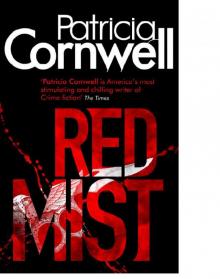 Red Mist
Red Mist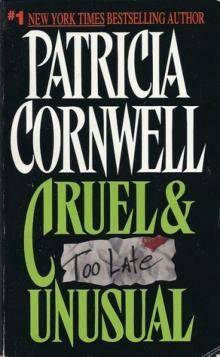 Cruel & Unusual
Cruel & Unusual Hornet's Nest
Hornet's Nest Four Scarpetta Novels
Four Scarpetta Novels Scarpetta's Winter Table
Scarpetta's Winter Table Isle of Dogs
Isle of Dogs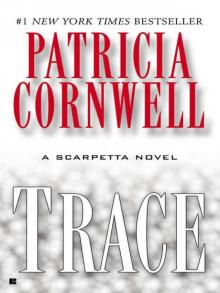 Trace
Trace Postmortem
Postmortem Body of Evidence ks-2
Body of Evidence ks-2 Southern Cross
Southern Cross All That Remains
All That Remains Point of Origin
Point of Origin Depraved Heart
Depraved Heart Ruth, a Portrait: The Story of Ruth Bell Graham
Ruth, a Portrait: The Story of Ruth Bell Graham From Potter's Field
From Potter's Field Flesh and Blood
Flesh and Blood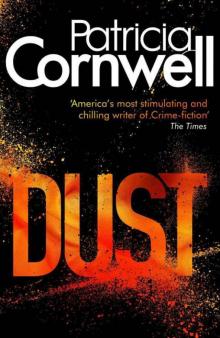 Dust
Dust The Body Farm
The Body Farm Port Mortuary
Port Mortuary Quantum
Quantum Portrait of a Killer: Jack the Ripper - Case Closed
Portrait of a Killer: Jack the Ripper - Case Closed Spin (Captain Chase)
Spin (Captain Chase) Cause of Death
Cause of Death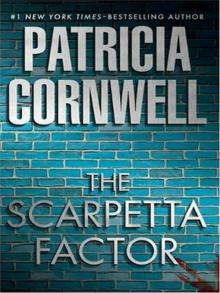 The Scarpetta Factor
The Scarpetta Factor Predator
Predator Scarpetta 18 - Port Mortuary
Scarpetta 18 - Port Mortuary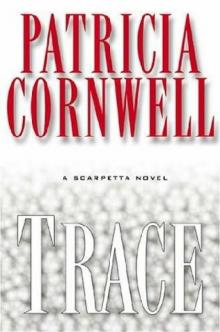 Trace ks-13
Trace ks-13 Portrait of a Killer
Portrait of a Killer Cruel and Unusual ks-4
Cruel and Unusual ks-4 Cause Of Death ks-7
Cause Of Death ks-7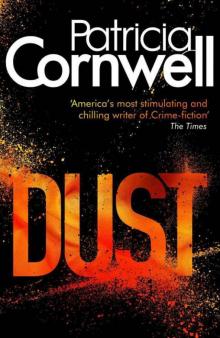 Dust ks-21
Dust ks-21 At Risk wg-1
At Risk wg-1 The Last Precinct ks-11
The Last Precinct ks-11 Book of the Dead ks-15
Book of the Dead ks-15 All That Remains ks-3
All That Remains ks-3 Ruth, a Portrait
Ruth, a Portrait Scarpetta's Winter Table (kay scarpetta)
Scarpetta's Winter Table (kay scarpetta) From Potter's Field ks-6
From Potter's Field ks-6 Scarpetta
Scarpetta Isle of Dogs jhabavw-3
Isle of Dogs jhabavw-3 Hornet's Nest jhabavw-1
Hornet's Nest jhabavw-1 The Body Farm ks-5
The Body Farm ks-5 Blow Fly ks-12
Blow Fly ks-12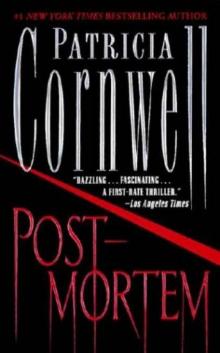 Post Mortem
Post Mortem Five Scarpetta Novels
Five Scarpetta Novels Chasing the Ripper (Kindle Single)
Chasing the Ripper (Kindle Single) Point of Origin ks-9
Point of Origin ks-9 Port Mortuary (2010)
Port Mortuary (2010) Unnatural Exposure ks-8
Unnatural Exposure ks-8 Southern Cross uhabavw-2
Southern Cross uhabavw-2 The Bone Bed ks-20
The Bone Bed ks-20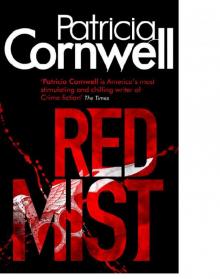 Red Mist ks-19
Red Mist ks-19 Port Mortuary (2010) ks-18
Port Mortuary (2010) ks-18 Predator ks-14
Predator ks-14